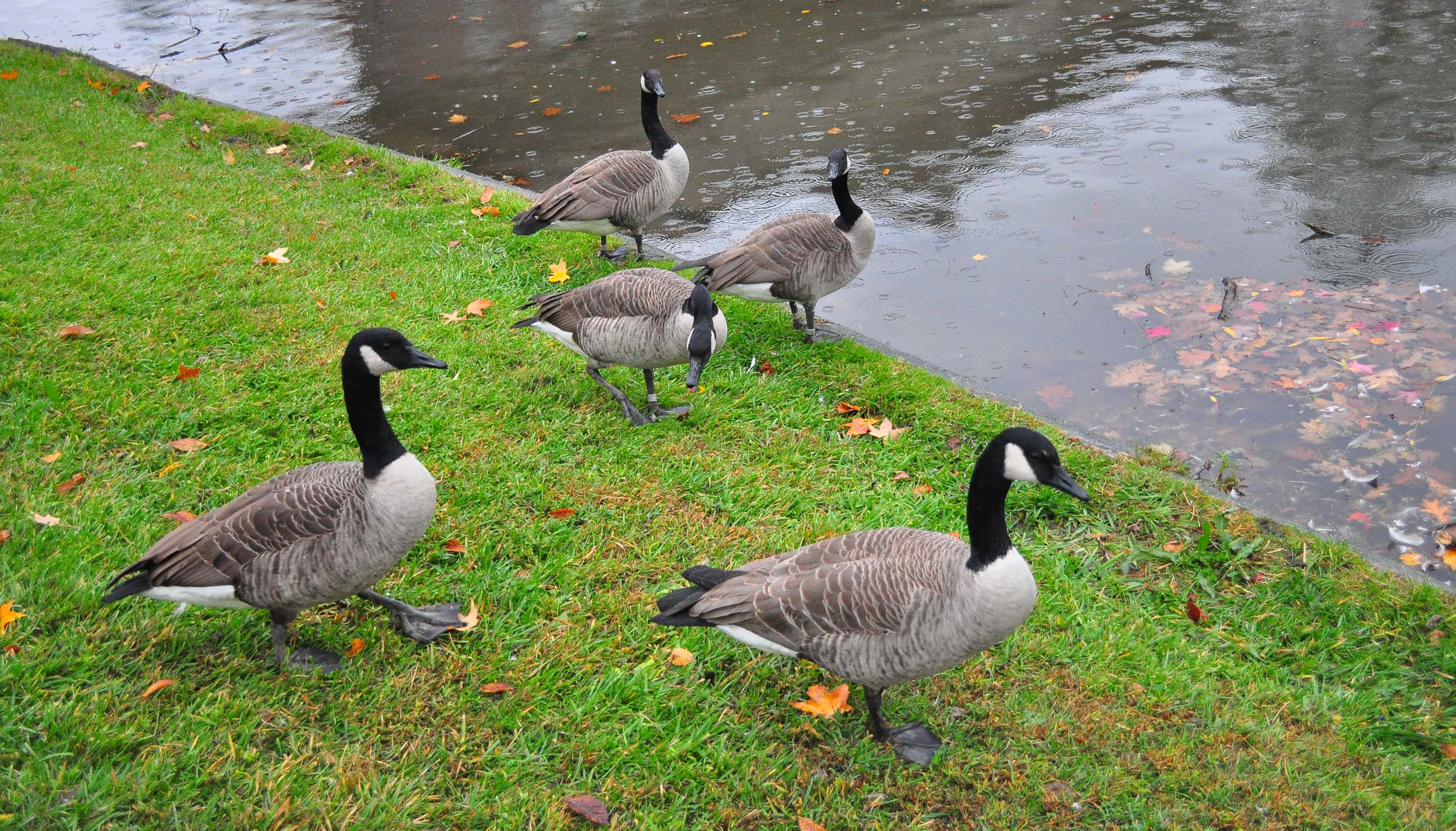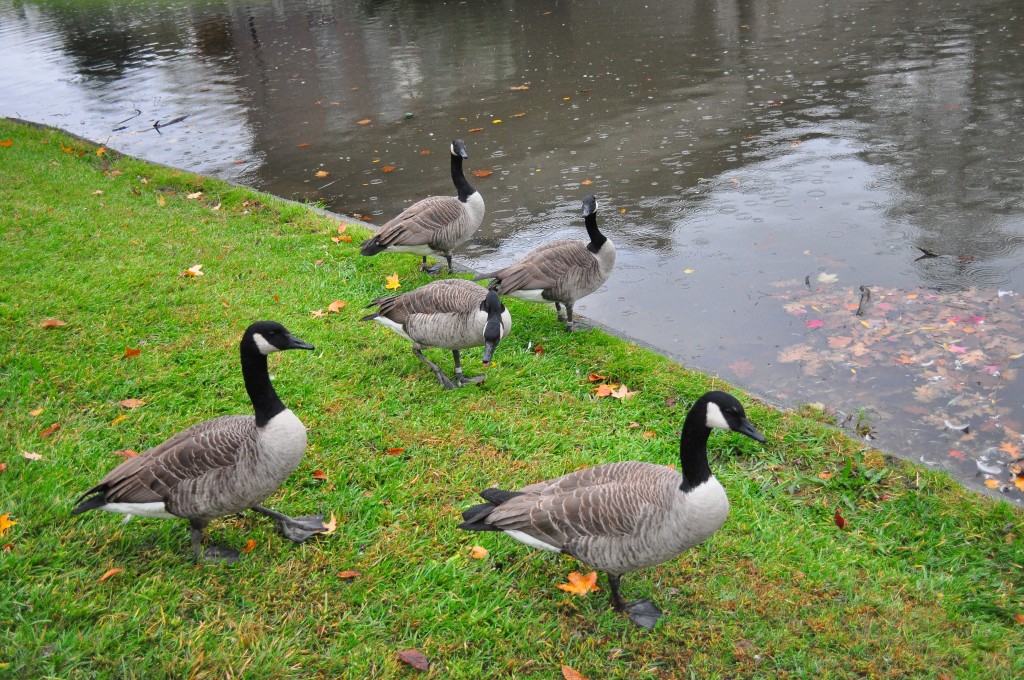

A goose-free SUNY New Paltz campus may only be a bark away.
After discussing several methods for removing the school’s goose population, Director of Environmental Health and Safety Mike Malloy has begun making plans to purchase a trained border collie with college funds to herd and shoo geese away from university grounds.
According to Malloy, any visiting Canadian geese on campus would be scared away and forced to move to a new location without being physically touched by the dog. With assistance from Wildlife Watch in New Paltz, Malloy said domestic geese living on campus would be given a new home where they would no longer be among students.
“I want to put them on a farm where, if they need any veterinary care, they’ll be given it,” said Malloy. “Here, nobody is assigned to take care of the geese. And quite frankly, most students are tired of cleaning goose [feces] off their feet from walking on it all of the time.”
After meeting with Interim President Donald Christian on Tuesday, Oct. 19, Malloy said the approval process was still pending, but feedback on the proposal was positive.
If permission is granted, Malloy said the college would spend approximately $5,500 on the border collie. As the dog’s handler, Malloy said he would be responsible for monitoring the herding process and providing shelter, while the college would assume all other expenses, including veterinary care and food.
For first-year electrical engineering major Lucas Silvestre, the geese have never been a major concern. He said that even though the birds may sometimes make loud noises in the later hours of the night, he has enjoyed their presence on campus.
“[The geese] are actually kind of charming, and they give this place a little more personality,” said Silvestre. “I don’t know if the geese have been depriving people of sleep, but if it’s just because they’ve been annoying, spending $5,000 on a dog seems a little bit unnecessary.”
While researching how other universities have dealt with geese, Malloy visited both Vassar College and the Culinary Institute of America – both of which have purchased and used border collies to remove geese living on campus.
According to Jeff Horst, director of special projects at Vassar, gaggles of geese presented a serious problem for the school in the past.
“Easily 300 geese had taken up residence on Sunset Lake,” Horst said. “They would migrate from there to the golf course during the day, and made two to three putting greens unplayable. Then they would fly out to our athletic fields and defecate all over the place, and that made the fields really hard to manage.”
Horst said he did an Internet search and found Big Bend Farm in Virginia, where an award-winning trainer rescued and bred border collies specifically for herding.
After Vassar purchased the dog, Horst was given handler responsibilities and was shown how to properly use commands. Soon after the border collie’s arrival, Horst said Vassar no longer had a single resident goose.
“I wasn’t sure if I wanted a dog, but I have no regrets,” Horst said. “This dog is exceptional in terms of behavior, obedience and work ethic.”
Despite Vassar’s Animal Rights Coalition backing his decision, Horst said he received some negative feedback. He said most of the criticisms, came from students and parents upset over the cost of the dog, which required an initial $4,500 to be spent from the school’s budget.
“I had one father of a student say to me, ‘you could pay my kid $4,500, and he’ll chase the geese,’” Horst said. “But he wasn’t going to go down there every day at 10 a.m., go into the water, run around and herd the geese.”
Malloy said the costs to maintain and clean up after geese on SUNY New Paltz’s campus have become significantly high, and the safety of the birds has become a concern.
This year, Malloy said several geese have been found dead not only from being struck by motor vehicles, but because of what he suspects to be “foul play.”
“We don’t know who did it, but we found some geese in the woods who had broken necks,” he said. “Somebody said maybe they just died, but the broken neck said otherwise. Some people suggested it was a fox or a coyote on campus, but then they would have been eaten. These particular birds were just lying there.”
According to Malloy, the school utilizes a water and brush system to clean excrement made by the geese, which requires six to eight hours of weekly work from campus employees.
When geese defecate on the athletic fields, Malloy said the school’s artificial turf must also be cleaned. And if fecal matter is tracked into dorms, students could suffer from upset stomachs and other health problems caused by a high volume of bacteria.
“For me, the cost of [the dog] is well worth it when I’m cutting down labor costs and health risks,” he said. “The costs of the people doing hours of work to clean up the feces, plus the equipment they have to maintain to do that, plus the washing of that stuff – it all adds up.”
If approved, Malloy said he would enjoy giving students the opportunity to choose a new name to train the border collie to respond to. He has also approached art students to create wooden “dog silhouettes,” which would be placed around campus to help assist in scaring away geese.
As he waits for the final decision, Malloy is also working with Wildlife Watch to choose an “ideal” home for the school’s domestic geese. In order for his plan to work, the border collie must be introduced to the campus by February.
“In March, Canadian geese start nesting,” Malloy said. “I don’t want to disturb nesting geese. That’s not fair for them. If they made it this far and made their nest here, they’ve earned the right to raise their goslings.”
